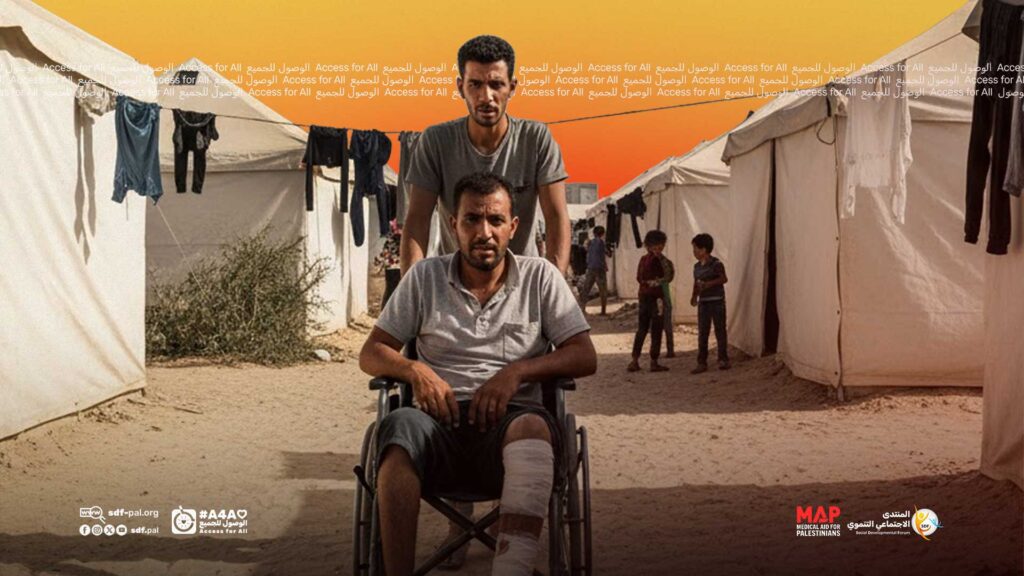Under Access for All Project, A New Advocacy Campaign to Advocate for Aid Accessibility for People with Disabilities in the Gaza Strip

The Social Developmental Forum (SDF) has launched a new advocacy campaign titled “Improving Access to Humanitarian Aid for People with Disabilities in the Gaza Strip,” responding to the severe challenges they have been facing amid the ongoing aggression, blockade, and deteriorating humanitarian conditions.
The campaign falls under the activities of the “Access for All: Enhancing Independence and Inclusion of Persons with Disabilities in the Gaza Strip” project, implemented by SDF in partnership with the Medical Aid for Palestinians (MAP), and is driven by the SDF’s youth-led A4A network.
Evidence-based Advocacy
The campaign was preceded by comprehensive field research conducted by the A4A network, revealing that the humanitarian response in Gaza since October 2023 has failed to be inclusive. People with disabilities have been facing the highest levels of exclusion and discrimination in accessing emergency services and aid.
The field analysis, which entailed 208 quantitative surveys, three focus groups, and four expert interviews, found that displacement camps were largely inaccessible and evacuation attempts were often dangerous or impossible, endangering many lives.
The report revealed that 92% of people with disabilities face difficulty accessing basic services, 88% observed no accommodations or suitable facilities at aid distribution points, 78% were never consulted in humanitarian decisions affecting them, and less than 1% of humanitarian funding is allocated to inclusion programmes.
These shocking figures expose a profound gap between stated commitments to inclusion standards and the actual practice on the ground.
Bridging the Gap?
The A4A campaign advocates for reforming humanitarian response to ensure aid is genuinely inclusive and equitable. It aims to improve access for people with disabilities by adapting distribution centres and digital registration systems, while ensuring their meaningful participation in needs assessment and planning processes.
Project Coordinator Hussam Soboh stated: “This campaign reminds us that humanitarian response only succeeds when it’s inclusive, fair, and equitable, without exception. This isn’t a mere awareness activity, but a collective call to rebuild response systems based on dignity, equality, and inalienable right to full participation for everyone.”
From the beginning, youth showed tremendous passion and ownership, from content writers to designers and field volunteers. We prepared, tested, and refined until we created a campaign we’re truly proud of. They worked sincerely to amplify the voices of people with disabilities and affirm they belong at the heart of society, not on the edge.
Bara’ah Ahmed, Project Assistant
The campaign focuses on pushing humanitarian institutions to adopt clear accessibility standards, engaging representative organizations of people with disabilities in decision-making, raising awareness among communities and donors about their right to dignified aid access, and establishing community monitoring tools to track accessibility progress.
Walking the talk; Digital and physical actions
The campaign will include an integrated series of field and media activities, including field hearing sessions that enable people with disabilities to share direct testimonies, podcast episodes featuring real-life stories reflecting daily challenges, and dialogue sessions with humanitarian workers to present field-based recommendations. This will be complemented by multi-stakeholder dialogues bringing together humanitarian agencies, donors, and representative organizations, alongside a digital advocacy campaign sloganed #AccessForAll to raise awareness of the local community, and the production of a comprehensive factsheet summarizing key findings and indicators about the reality people with disabilities have been enduring in the Gaza Strip.
A Platform to Amplify the Voices of People with Disabilities
SDF emphasizes that this campaign directly responds to the voices of people with disabilities themselves, reflecting its longstanding commitment to the principle of “Leaving No One Behind” and the belief that humanitarian justice can only be achieved through full inclusion of all segments.
The campaign is promised to become a platform for change and accountability, placing the issues facing people with disabilities at the heart of humanitarian discourse and pushing toward a more just and equitable response across the Gaza Strip, where access to services becomes a right, not a privilege.
The Access for All project represents a significant step in promoting the rights and well-being of people with disabilities in the Gaza Strip. Launched this year and continuing through March 2026, the project spans in the northern, middle, and southern areas of the Gaza Strip, focusing on enhancing the autonomy of people with disabilities and other vulnerable groups by improving their access to basic humanitarian needs, strengthening their integration to the local community, and ensuring a service providers are held accountable.

